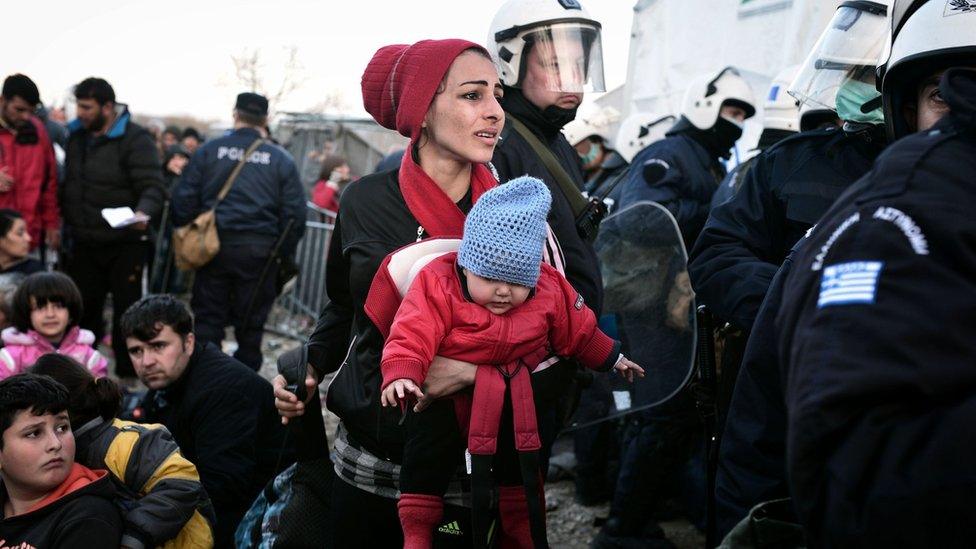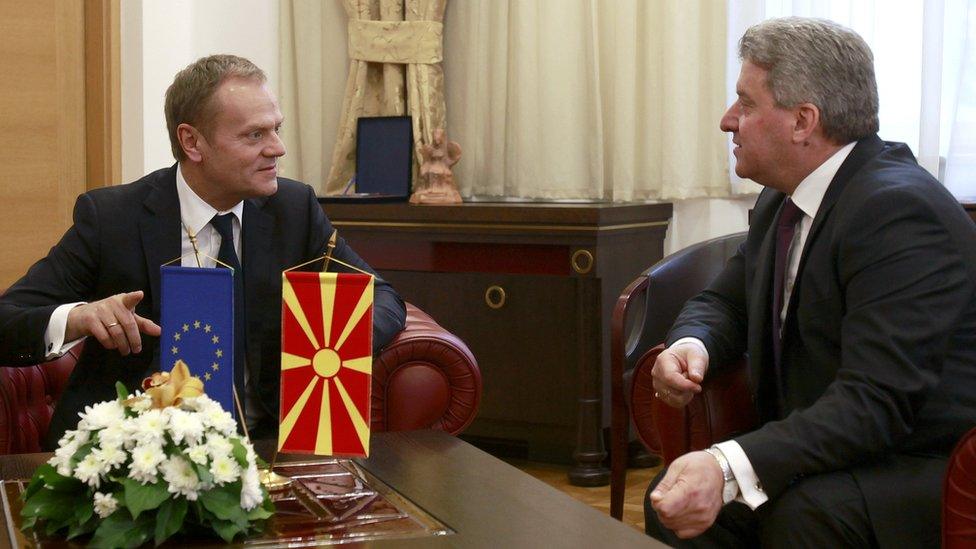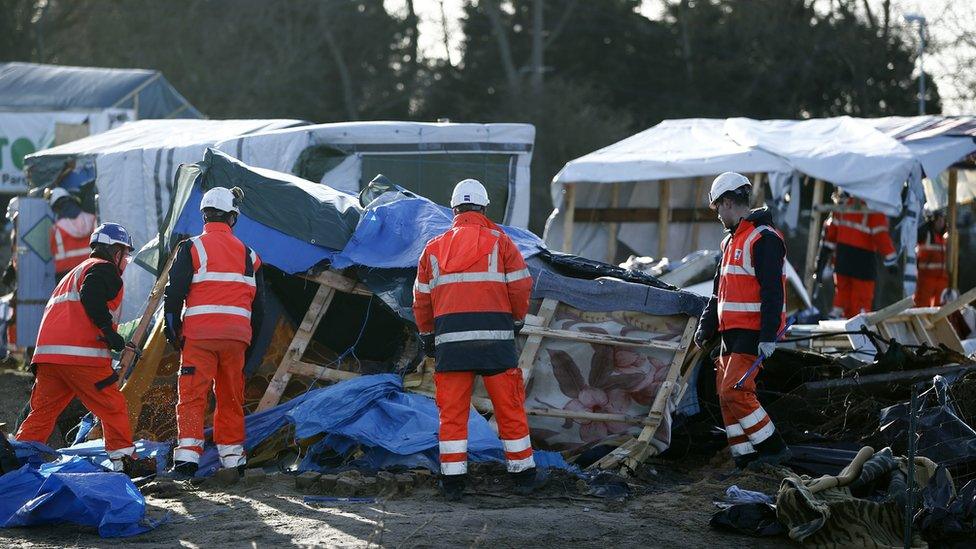EU's Tusk warns illegal economic migrants: Do not come here
- Published
Donald Tusk: "Do not risk your lives to come to Europe"
European Council President Donald Tusk has warned illegal economic migrants against coming to Europe, during a new push to solve the EU migrant crisis.
He said illegal economic migrants were risking "lives and money" for nothing.
Mr Tusk visited Greece and Turkey on Thursday to discuss ways to reduce the flow of migrants travelling west.
More than 25,000 migrants have been left stranded in Greece by a tightening of border controls to the north, raising fears of a humanitarian crisis.
On Thursday, a group of migrants blocked a railway line on the Greek side of the border with Macedonia to protest at the restrictions.
They were imposed after several Balkan countries decided only to allow Syrian and Iraqi migrants across their frontiers. Austria also decided to limit numbers.
The move effectively barred passage to thousands of people seeking to reach western Europe, including Afghans as well as some more likely to be regarded as economic migrants.
Desperate migrants plead to flee 'hellish' camp
Europe 'on cusp of self-induced crisis'
After meeting Greek Prime Minister Alexis Tsipras in Athens on Thursday, Mr Tusk said he was appealing to "all potential illegal economic migrants", wherever they may be from.
"Do not come to Europe," he said. "Do not believe the smugglers. Do not risk your lives and your money. It is all for nothing."
He also said EU member states must avoid taking unilateral action to deal with the migrant crisis.

Macedonia is blocking migrants at the Greek border, raising fears of a humanitarian crisis
Separately, UK Prime Minister David Cameron and French President Francois Hollande discussed security and migration issues in the French city of Amiens, including conditions at the French port of Calais, where thousands of migrants hoping to enter the UK have been living rough.
After the talks Mr Hollande warned of "consequences" for management of migrants heading to Britain if the UK voted to leave the European Union in a June referendum.
Earlier, French Economy Minister Emmanuel Macron said his country could allow migrants to travel unchecked to the UK in the event of a so-called "Brexit".
He told the Financial Times newspaper, external that an exit vote could end a bilateral deal allowing the UK to vet new arrivals on French territory.
Authorities in Calais have been clearing part of a sprawling camp known as the Jungle, from where many migrants are trying to enter the UK illegally.

Mr Tusk, left, held talks with Macedonian President Gjorge Ivanov in Skopje on Wednesday
Ahead of an EU-Turkey summit on the issue on Monday, Mr Tusk travelled to Turkey later on Thursday for talks with Turkish Prime Minister Ahmet Davutoglu.
Mr Davutoglu said that the flow of Syrian refugees would lessen if the cessation of hostilities in the conflict held, adding that violations by Syrian government and Russian forces had left it vulnerable.

Analysis: Selin Girit, BBC News, Ankara
Turkey already accommodates over 2.5 million Syrian refugees - at an estimated cost of €7 (£5.4bn). The EU has pledged €3bn to Turkey, which is calling for more support.
Mr Davutoglu repeated that they expected the opening of new chapters for Turkey's longstanding EU membership bid and progress on visa-free travel to the EU for Turkish citizens.
Turkey has already offered to sign readmission agreements with 14 countries, a move that could enable it to take back migrants rejected by the EU more efficiently.
Turkish officials also say they have managed to prevent almost 25,000 migrants from travelling to Europe this year. But almost 130,000 have made their way to Greek islands during the same period.
In the EU summit in Brussels next week, there will be calls on Turkey to do more to reduce the numbers of migrants.

Mr Tusk said earlier this week that Europe was ready to grant "substantial financial support" to countries neighbouring war-torn regions such as Syria and Iraq.
"But at the same time we expect a more intensive engagement from our partners as an absolute precondition to avoid a humanitarian disaster," he said.
Slovakia goes to the polls on 5 March
Turkey has expressed frustration at the lack of a common position from the EU on the crisis.
BBC Europe Correspondent Chris Morris, who is on the Greek island of Lesbos where 75,000 migrants have already arrived so far this year, says the EU wants to see arrivals in Greece drop below 1,000 a day.
New figures suggest last year's total of one million seaborne migrants arriving in Europe could be matched well before the end of the year.


France says it wants to relocate many of the migrants at the Calais "Jungle"
The number of migrants stuck in Greece has soared, after Macedonia began restricting passage to all but a small number. More migrants are en route from Athens.
Earlier this week, the European Commission adopted plans to distribute €700m (£543m; $760m) of emergency humanitarian funding between 2016-18 to help tackle the crisis.
Greece has asked the European Commission for nearly €500m in assistance to help care for 100,000 asylum seekers.
The International Organization for Migration (IOM) said nearly 129,500 migrants had arrived in Europe by sea so far in 2016, external, plus another 1,545 by land. It said 418 had drowned or were missing.
A note on terminology: The BBC uses the term migrant to refer to all people on the move who have yet to complete the legal process of claiming asylum. This group includes people fleeing war-torn countries such as Syria, who are likely to be granted refugee status, as well as people who are seeking jobs and better lives, who governments are likely to rule are economic migrants.